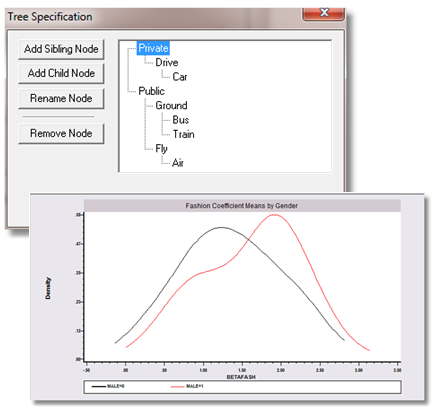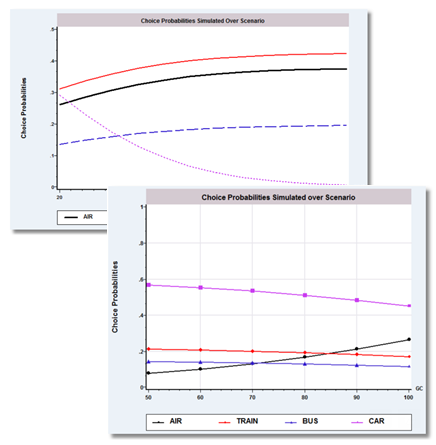LIMDEP und seine Erweiterung NLOGIT liefern Ihnen alles, was Sie sich im Bereich der Ökonometrie wünschen. Angefangen bei einfachen Zeitreihenmodellen (ARIMAX) über klassische lineare Regression - auch für binäre, multinomiale Zielgrößen und Zähldaten - bis hin zu hochspezialisierten Modellen (Discrete Choice Models, Gemischte Modelle für Panel-Daten) deckt LIMDEP alles ab.
NLOGIT bietet als zusätzliche Funktionen noch speziellere Methoden an - besonders im Kontext der Discrete Choice Modelle (Generalized Mixed Logit, Generalized Nested Logit, ...). Ferner gibt NLOGIT Ihnen Zugriff auf die Simulations-Plattform und somit die Möglichkeit, verschiedene Vorhersagen basierend auf Ihren Modellen für unterschiedliche Szenarien zu erstellen.
Nicht zuletzt gibt die systemeigene Programmiersprache einen hohen Grad an Flexibilität.
Argumente für NLOGIT und LIMDEP:
- Umfangreiche Funktionen im Bereich der Ökonometrie
- Spezielle Modelle zur Modellierung von Markenpräferenzen
- Flexible systemeigene Programmiersprache
- Erstellt verschiedene Vorhersagen für unterschiedliche Szenarien
- Bietet zusätzliche Funktionen für speziellere Methoden als Ergänzung zu Limdep
Dies könnte Sie auch interessieren
Limdep
Stata SE
Stata MP
NLOGIT (inkl. LIMDEP)
NLOGIT ist das weltweit führende Programm zur Analyse und Simulation von diskreten Daten, wie zum Beispiel Markenpräferenz, Transportmethode sowie alle möglichen Survey und Marktdaten.
NLOGIT beinhaltet alle Funktionen der Software LIMDEP plus die FIML-Schätzmethoden von NLOGIT.
NLOGIT bietet Schätzmethoden für alle aktuellen Modelle, wie gemischte (zufällige Koeffizienten) Logit-, genestete Logit-, multinomiale Probit- und heteroskedastische Extremwert-Modelle. Bei der Wahl von Choice Set Variablen besteht vollkommene Freiheit. Daten können als einzelne Beobachtungen, Rangordnungen, Häufigkeiten oder Marktanteile vorliegen. Datensätze können außerdem revealed und stated Preferences kombinieren.
NLOGIT Version ist eine Erweiterung von LIMDEP. Zusätzlich zu allen Funktionen von LIMDEP werden Methoden zur Schätzung, Modellsimulation und Analyse von Multinomialen Choice Sets bereitgestellt. Das Beinhaltet z.B. Markenpräferenzen, Transportmethoden und generell Survey- und Marktdaten bei denen der Kunde die Wahl zwischen verschiedenen Alternativen hat.
NLOGIT ist das Standardpacket zur Schätzung und Simulation von multinomialen, diskreten Choice-Modellen. In Version 5.0 wird unter anderem ein Full Information Maximum Likelihood (FIML) Schätzer für bis zu vierfach genestete Logit-Modelle zur Verfügung gestellt. Zusätzlich werden viele andere Methoden von NLOGIT unterstützt. Das beinhaltet zufällige Koeffizienten (im Rahmen von gemischten Logit-Modellen), latente Klassen, multinomiale Probit-Modelle, viele Formen von genesteten gemischten Logit-Modellen sowie verschiedene neue Methoden zur Analyse von Panel-Daten. NLOGIT enthält alle Funktionen und Möglichkeiten von LIMDEP sowie NLOGITs FIML Schätzalgorithmus. Als Kombination von LIMDEP und NLOGIT ist NLOGIT das einzige große Programmpaket zur Analyse von diskreten Choice Sets, dass gleichzeitig den vollen Funktionsumfang eines Ökonometrieprogramms liefert.
Weitere Informationen
Systemvoraussetzungen:
Windows®Operating SystemWindows XP, Vista, 7 (32-/64-Bit), Windows 10
Min. RAM512 MBDisk SpaceMinimum of 100 MB of disk space
What’s New in NLOGIT Software?
All the new features described for LIMDEP are in NLOGIT. In addition, there are many new features in Version 6. We have added several enhancements to give you greater flexibility in analyzing different types of data. Many of the features of NLOGIT, existing and new, are designed to let you go beyond just computing coefficients, to analyzing and using your model. We have added many new models including the random regret logit model and best/worst outcome. NLOGIT continues to pioneer new developments for estimation in WTP (willingness to pay) space. Altogether, we have added dozens of features in NLOGIT, some clearly visible ones such as the new models and some ‘behind the scenes’ that will smooth the operation and help to stabilize the estimation programs. The following will summarize the important new developments.

New Multinomial Choice Models
NLOGIT includes many new commands and extension of the random parameters model and latent class models:
- Fixed effects in multinomial logit models
- Random effects multinomial logit models
- Random regret logit model
- Best/worst outcome data
- Berry, Levinsohn and Pakes random parameters logit model
- Latent classes with random parameters
- Generalized mixed logit
Model Extensions
- Willingness to pay
- Attribute nonattendance (explicit and implicit)
- Individual specific expected parameters
- Model simulation
- Estimated elasticities and partial effects
- Robust covariance matrix
- Random data generators
- Posterior estimates from latent class models
- Coefficients in random parameters models
- Simplified WALD command

More NLOGIT Features
NLOGIT includes all of LIMDEP plus the full set of features in NLOGIT, including the additional data management features, estimators for many types of discrete choice models, and the program simulator.
- Data Analysis
NLOGIT will typically be used to analyze individual, cross section data on consumer choices and decisions from multiple alternatives. But, the program is equally equipped for market shares or frequency data, data on rankings of alternatives, and, for several of the estimators, panel data from repeated observation of choice situations. There are several data handling procedures for NLOGIT in addition to all those available in LIMDEP. - Model Estimation
NLOGIT supports a greater range of models for discrete choice than any other package. These include state of the art estimators for the mixed (random parameters) logit model, WTP space, random regret, and nonlinear utility models. The basic multinomial logit model, nested logit models up to four levels, the multinomial probit model are also supported.
NLOGIT contains all of the discrete choice estimators supported by LIMDEP, plus the extensions of the discrete choice models which do not appear in LIMDEP.
These include:- Multinomial logit - many specifications
- Random effects MNL
- Generalized mixed logit
- Random regret logit
- MNL with nonlinear utility functions
- WTP space specifications in mixed logit
- Scaled multinomial logit
- Nested logit
- Generalized nested logit
- Multinomial probit
- Mixed (random parameters) logit
- Heteroscedastic extreme value
- Covariance heterogeneity
- Latent class
- Latent class random parameters
- Nonlinear utilities with random parameters
- Model Specification
NLOGIT’s estimation programs are accessed as LIMDEP model commands. Since discrete choice models are often more complicated to specify than other single equation models in LIMDEP, the command setup includes many specifications that are specific to NLOGIT. - Inference Tools for Hypothesis Testing
The full set of post estimation and analysis tools in LIMDEP is accessed by NLOGIT. This includes the Wald, likelihood ratio and Lagrange multiplier tests, and all the matrix algebra and scientific calculator tools. NLOGIT also provides tools specific for discrete choice analysis, including built-in procedures for testing the IIA assumption of the multinomial logit model. - Simulation
Any model estimated by NLOGIT can be used in ‘what if’ analyses using the model simulation package. The base case model produces fitted probabilities data that aggregate to a prediction of the sample shares for the alternatives in the choice set. The simulator is then used, with the estimation data set or any other compatible data set, to recompute these shares under scenarios that you specify, such as a change in the price of a particular alternative or a change in household incomes.



